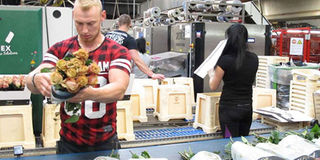Smell of roses: Kenya exports over 1bn stems to Amsterdam

Workers at Decofresh Roses in The Netherlands process flowers from Kenya. PHOTO | MICHAEL ORIEDO | NATION MEDIA GROUP
What you need to know:
- The Dutch Flower Group processes 10 billion stems a year, worth 4.7 billion Euros (the equivalent of Sh564 billion).
- A good business environment that is favourable to the flower business has also made the buyers stick with Kenyan growers.
- Global demand for flowers has been on the rise, according to the flower dealers, as economies perform better.
AMSTERDAM
Every time an aeroplane lifts off at the Jomo Kenyatta International Airport on its way to Europe, there is a high likelihood that it is carrying a flower consignment that will end up at the Royal FloraHolland.
This is the largest flower auction in the world and is located at Aalsmeer, Southwest of Amsterdam in The Netherlands.
Mr Marcel Zandvliet, the Director of Marketing & CSR at the Dutch Flower Group (DFG), says dealers in the flower capital receive 42 floral cargo flights every week from Kenya.
“For DFG companies, every day we handle 2.5 million rose flowers stems from growers in Kenya. These are about 13 per cent of all flowers that come from Kenya. The roses are private label packed or put into mixed bouquets for the larger European supermarkets,” he said.
Besides Kenya, the company also sources flowers from Ethiopia and South America.
BLENDING
In Kenya, flowers are grown in Naivasha, Mt Kenya region, Nairobi, Thika, Kitale, Nakuru, Kiambu, Athi River and Kericho, among other places.
The DFG blends the roses with various flowers to end up with custom-made bouquets in high volumes for mass retail.
The Royal FloraHolland is a massive warehouse, where at one section, over 250 men and women usually sit behind computers, their eyes firmly glued on the machines, as they listen attentively through headphones every day.
At the centre of the room is a huge screen displaying what the participants are monitoring on their computers.
And at the far end of the room, a man sits in a cubicle alone behind a computer.
That man - the auctioneer - puts various flower varieties from across the world on the block, as the rest of those in the room place their bids.
PRODUCTIVITY
Millions of flower stems from different parts of the globe, including Kenya, land at the nearby Amsterdam Airport Schiphol and are taken to the auction for sale from between 6am and 9am.
The lower part of the two million-square-metre warehouse that hosts the auction and flower firms is always a beehive of activity as some 2,000 workers process orders from the bidders.
The workers pack the flowers in boxes, hoist them onto motorised trolleys which then deliver the boxes to trucks that ferry them to the airport, where they are sent to any part of the globe.
“Forty-three per cent of the flowers that come to The Netherlands are sold through the auction and the rest through direct sales,” Mr Harm-Jan Mostert, the International Key Account Manager Africa at the Royal FloraHolland, said.
The company, which is owned by flower growers through a corporation, processes 10 billion stems a year, worth 4.7 billion Euros (the equivalent of Sh564 billion).
Kenya’s roses tick at the auction, with the company handling 800 million stems annually, Mr Mostert. Prices average 25 Euro cents.
GOOD CLIMATE
The DFG, a conglomerate of 30 companies, is one of the largest buyers of Kenyan roses in The Netherlands, both through the auction and directly from growers.
Not far from DFG is Decofresh Roses, which sources flowers exclusively from Kenya.
“We deal with 12 companies based in Nakuru, and they grow roses for us alone. We have been in the business for 15 years,” Mr Matti Arielle, the proprietor, said.
Between them, the 12 firms grow some 100 varieties of flowers each on a total of 300 acres.
“We have thousands of varieties from Kenya to pick from and it all depends on the season, events and the people," he told the Saturday Nation. "I can say we have 12,000 varieties that the farms grow for us".
So what makes Kenyan flowers tick at the world market?
“Kenya has a good climate that enables roses grow well throughout the year. With temperatures averaging 24 degrees Celsius through the year especially in our growing zones, this enables us get the best roses,” Mr Arielle said.
STATE SUPPORT
A good business environment that is favourable to the flower business has also made the buyers stick with Kenyan growers.
“We are getting support from authorities and institutions like Kenya Flower Council and the Kenya Plant Health Inspectorate Service. This has enabled our partner farms to expand and create sustainable businesses,” the flower merchant added.
Decofresh sells the roses mainly to florists in different parts of the world, making deliveries every day.
“We get over 200 million stems of cut flowers from Kenya each year that we sell at 3 Euro cents each. They come after every three days,” he said.
Besides roses, other flowers sold at the auction include Gerberas Daisies, chrysanthemums, Blue Iris, lilies, carnations, amaryllis, gerbera and tulips.
DEMAND
But it is not all rosy for the flower companies. Among issues that affect the smooth flow of flowers from Kenya are bad political situations that hinder logistics and unfavourable news.
"When consumers hear of the negative news, they cannot buy roses from Kenya. This means we cannot brand the products as Kenyan to guard our businesses.”
Global demand for flowers has been on the rise, according to the flower dealers, as economies perform better.
Last year, Kenya exported flowers worth $1 billion, according to the Kenya Flower Council. Multiply that by 100 to get the shilling equivalent.





